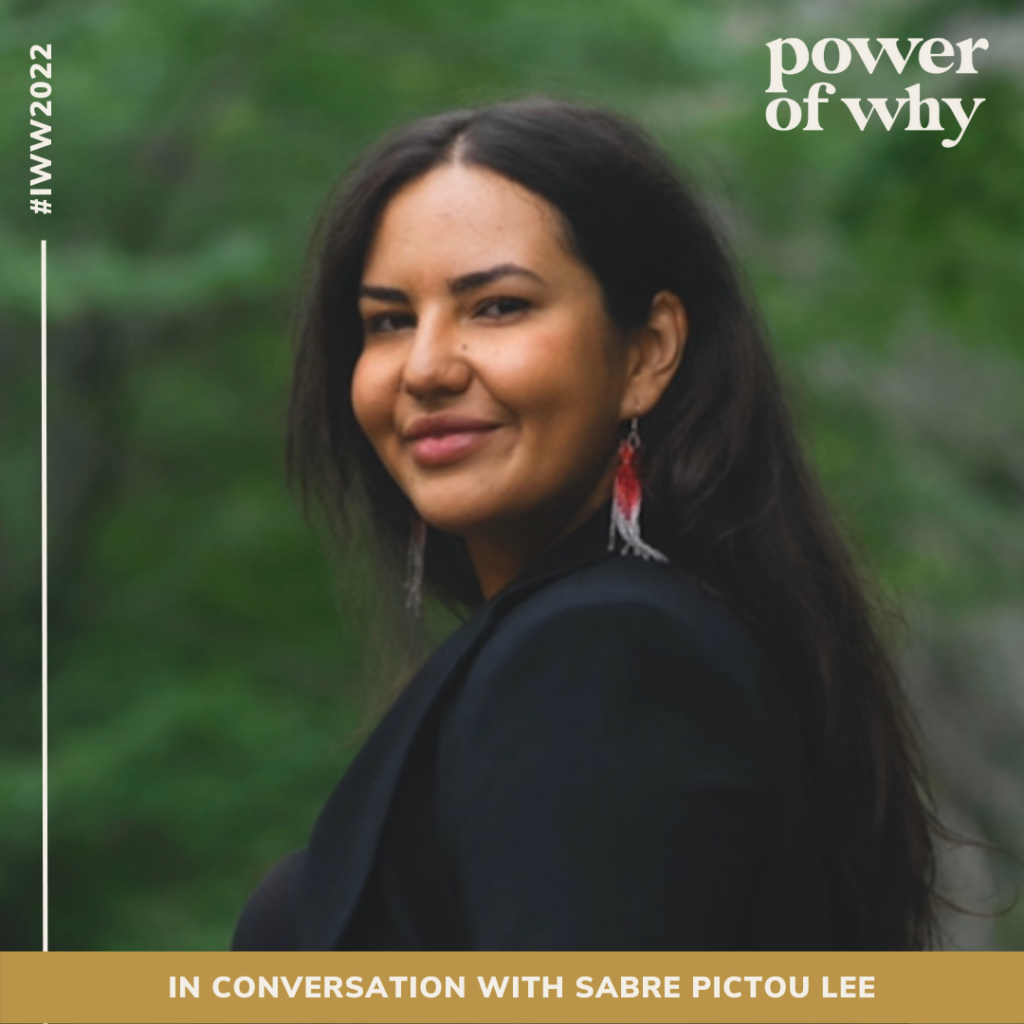Home » No, Anti-Colonial Ideas Aren’t “Radical” with Sabre Pictou Lee
No, Anti-Colonial Ideas Aren’t “Radical” with Sabre Pictou Lee

Mar 10, 2022
 This featured story is brought to you by the Power of Why Podcast in collaboration with Invest Ottawa. We teamed up to produce this special series to celebrate women leading in Ottawa for International Women’s Week (IWW 2022) and shine the spotlight on our IWW 2022 featured leaders to unpack their passion and purpose.
This featured story is brought to you by the Power of Why Podcast in collaboration with Invest Ottawa. We teamed up to produce this special series to celebrate women leading in Ottawa for International Women’s Week (IWW 2022) and shine the spotlight on our IWW 2022 featured leaders to unpack their passion and purpose.
Each year, five inspirational leaders are selected to represent International Women’s Week. They are role models achieving a significant impact on our economy, community and society, and embody the spirit, goals and values of IWW.
With her diverse team of experts, Co-founder and CEO of Archipel Research and Consulting Inc. Sabre Pictou Lee is harnessing them to help organizations change for the better.
A highly acclaimed Indigenous speaker, trainer, liaison and researcher, Sabre’s company has supported the Canada Council for the Arts, Assembly of First Nations and Global Centre for Pluralism (to name a few).
Today, Sabre shares why anti-colonial ways and concepts aren’t radical, how she built her business from the ground up, and the frameworks you can apply to make yours more inclusive.
This episode is for you if:
- You’ve heard of anti-colonial principles but don’t know what they mean
- You want to start a business that challenges the status quo
- You want to meaningfully support Indigenous peoples
- You’ve struggled to work through your anxiety
Listen to the episode on Spotify / iTunes / Google Podcasts / Castbox
Tune in to the podcast or take the time to digest each article found below. Regardless the format, there is stellar content in store for you!
Naomi: How did you grow up?
Sabre: I’m Mi’kmaq from Eel River Bar First Nation in New Brunswick, but through the process of colonialism I was raised closer to Northern Ontario. I felt a deep sense of displacement that was amplified by experiences of racism.
I was a troublesome kid. I went to five different high schools, a handful of which I was expelled from. That’s not uncommon for a lot of BIPOC (Black, Indigenous and People of Color) youth, especially Indigenous youth.
I channeled a lot of my experiences through athletics. In high school, I played rugby and had a coach from Concordia University encourage me to apply to play there. I didn’t graduate high school until I was 20, but they helped with the application process.
In my third year, the university started a First People studies program, which centers on Indigenous Studies in Canada. That ignited a passion I didn’t know I had. All of a sudden, there was a field where I could explore my experiences, articulate them, and change things. I went from being a difficult student to achieving great grades.
In my fourth or fifth year, an Inuit Art History professor named Heather Igloliorte was the single person in my young life to say, “Why don’t you go do your master’s degree?” This changed the way I think and I did go on to do my masters in Indigenous and Canadian Studies at Carleton University, and graduated with a 4.0 average.
There, I was working as a researcher within Indigenous Studies and EDI (Equity Diversity and Inclusion) when I realized Indigenous values and principles weren’t being reflected in research.
These reports shape policy and the directions of organizations. But they were conducting research that was about us without us.
My co-founder and I decided that playing by the rules wasn’t doing us justice so we created Archipel in 2019. From there, I went on to complete my Juris Doctor of Law at Dalhousie University, at the Schulich School of Law.
I was a full time student balancing that with building a company that has grown to be a leader in Indigenous research and EDI work. We now have more than 25 staff on our team.
Naomi: What unique perspective do you offer your clients at Archipel?
Sabre: We engage in our work through the Black feminist theory of intersectionality, as well as consensus decision making, and Etuaptmumk, a Mi’kmaq methodology known as two-eyed seeing.
Intersectionality recognizes that experiences from different lenses often intersect, are nuanced in themselves and must be explored. Consensus decision making means we remove hierarchical schemes, sitting down in a talking circle with our team.
We move forward in unison instead of making unilateral decisions. With our clients, we meet people where they are to help them get to where we want to be.
That plays into Etuaptmumk, which is the idea that both the Western lens and the Indigenous lens have strong principles, and we don’t have to pick one or the other, but can blend their strengths.
Naomi: What conditions need to exist for us to make decisions through consensus-building?
Sabre: Leave your ego at the door. That’s a good way to understand the principles of smudging. It frees you of past thoughts, ideas, and energies. Everyone’s lived experiences are valid. That’s what consensus is about.
Naomi: What are some Indigenous principles that you want to share with our audience?
Sabre: The specifics vary from field to field. A great tool is UNDRIP, the United Nations Declaration of Rights of Indigenous Peoples. It’s inclusive of many Indigenous principles and values, centered around self-determination, ownership, control and free prior informed consent.
Indigenous systems and ways of knowing deserve equal footing. Learn, understand and respect our differences.
Naomi: Yours is an unconventional path. How can we create new ways forward, whether in our professional or personal lives?
Sabre: If being equitable and honoring Indigenous stewardship and the nuances within the BIPOC community is innovative to you, you need to examine what you think being inclusive is.
I encourage our clients to pay people well (above living wages, reflecting inflation), take critical feedback from their teams and facilitate work-life balance. At Archipel we close at 2pm on Friday. The goal is to get to a four-day workweek.
Indigenous principles of rest and family and Black feminist principles of radical rest shouldn’t be groundbreaking. Allowing these nuances to exist, instead of trying to restrain them, creates a better working environment.
If you’re an individual trying to challenge an idea, you need a lot of faith in yourself as an entrepreneur. That’s not easy. Be radical, be innovative, be creative.
We’re working BIPOC reparations into our invoices, where we charge clients a fee that goes towards BIPOC community initiatives. We’re starting a Continuing Education Fund for our staff. And we’re communicating that to our clients.
Naomi: Can you tell us more about colonial ways of working?
Sabre: If you’re not living the grind, you’re not successful. That’s super colonial. If you want to get out of poverty, you have to work 80 hours a week. That prioritizes economic development and benefit over individual wellbeing.
We can structure work and enjoyment without compromising concepts of economic development and creating jobs.
When most of our full time employees work 30 hours a week and receive pay equal to someone in the federal government working 40 hours a week, what happens? There’s more time to engage in other activities that are reciprocal to the economy.
We don’t have to run ourselves to the point of a nervous breakdown. Liberation starts right now—in how we exist, the kind words we speak to our families or the people we see outside.
This idea of taking care of your community and your neighbors, this reciprocal relationship, is anti-colonial, but is also beneficial to the state.
Professional gatekeeping plays into this. My favorite way to combat these barriers is by challenging yourself to invest in your organization, commit your resources internally. Instead of hiring someone new, you can pay to send a team member to a mentorship program.
If you’re looking solely for somebody with academic credentials, you’re ignoring an entire population that learns differently. These colonial institutions are barriers for everyone.
We have a researcher who has not gone through formal academic training and is absolutely brilliant.
Naomi: What are some commitments you’ve made to yourself?
Sabre: My father calls me a Formula One race car, and says I have to care for myself like one. It’s a nice way of saying I’m high strung and intense. But those qualities bode well for an entrepreneur.
I am the CEO and Co-Founder, but I am only one person of our amazing team. If I need to step out to take a break, it will function without me. I wake up at 4am to send emails. But I prioritize self care in terms of working out, and eating and sleeping well.
I struggle with generalized anxiety, which is challenging. I like to paint, I do traditional hand poke tattooing – these outlets, when I’m overwhelmed, help me find balance, to be the best version of myself. But sometimes that’s not possible.
At Archipel, everyone is cared for, and I can say “I’m having panic attacks today, I can’t go to the office.” People can share their struggles. They have mental health days. This is important to me.
We have a supportive community and that’s what allows me to be okay, even if I’m not at 100%.
Connect with Sabre
About the Power of Why Host, Naomi Haile

An intrapreneur, consultant, and interviewer.
Naomi Haile is curious about people, their paths and what drives them. In 2017, she launched the Power of Why Podcast. Her guests have taken the non-linear path in business, venture capital and other creative professions to share their story. Each episode explores people’s philosophy on life and work.
As we all navigate our lives and careers, Naomi hopes that everyone she connects with – guests and listeners – can shape products, companies, and communities of impact.
Naomi is a consultant at QuakeLab. She is starting graduate school at Columbia University.
In support of its Women Founders and Owners strategy, Invest Ottawa offers programs and services that enable and accelerate the growth and success of women entrepreneurs from every walk of life. Visit www.investottawa.ca/women to learn more!
Invest Ottawa
https://investottawa.ca
Invest Ottawa, is Ottawa’s leading economic development agency for fostering the advancement of the region's globally competitive knowledge-based institutions and industries. Invest Ottawa delivers its economic development services through a unique partnership with the City of Ottawa, where the City and Invest Ottawa, through its members set the strategy and manage the programs that move Ottawa’s economy forward. Invest Ottawa is a non-profit, partnership organization that operates on an annual budget that comes from a variety of sources including: municipal, federal and provincial government; membership fees; professional development programs; and private sector contributions.


